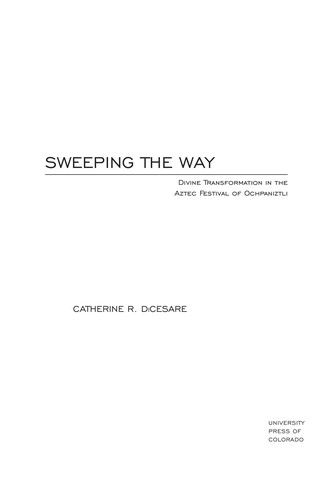

Most ebook files are in PDF format, so you can easily read them using various software such as Foxit Reader or directly on the Google Chrome browser.
Some ebook files are released by publishers in other formats such as .awz, .mobi, .epub, .fb2, etc. You may need to install specific software to read these formats on mobile/PC, such as Calibre.
Please read the tutorial at this link: https://ebookbell.com/faq
We offer FREE conversion to the popular formats you request; however, this may take some time. Therefore, right after payment, please email us, and we will try to provide the service as quickly as possible.
For some exceptional file formats or broken links (if any), please refrain from opening any disputes. Instead, email us first, and we will try to assist within a maximum of 6 hours.
EbookBell Team

4.8
24 reviewsIncorporating human sacrifice, flaying, and mock warfare, the pre-Columbian Mexican ceremony known as Ochpaniztli, or “Sweeping,” has long attracted attention. Although among the best known of eighteen annual ceremonies, Ochpaniztli’s significance has nevertheless been poorly understood. Ochpaniztli is known mainly from early colonial illustrated manuscripts produced in cross-cultural collaboration between Spanish missionary-chroniclers and native Mexican informants and artists.Although scholars typically privilege the manuscripts’ textual descriptions, Sweeping the Way examines the fundamental role of their pictorial elements, which significantly expand the information contained in the texts. DiCesare emphasizes the primacy of the regalia, ritual implements, and adornments of the patron “goddess” as the point of intersection between sacred, cosmic forces and ceremonial celebrants. The associations of these paraphernalia indicate that Ochpaniztli was a period of purification rituals, designed to transform and protect individual and communal bodies alike. Spanish friars were unable to apprehend the complex nature of the festival’s patroness, ultimately fragmenting her identity into categories meeting their expectations, which continues to vex modern investigations.
Taken together, the variety of Ochpaniztli sources offer a useful tool for addressing myriad issues of translation and transformation in pre-Columbian and post-conquest Mexico, as Christian friars and native Mexicans together negotiated a complex body of information about outlawed ritual practices and proscribed sacred entities.